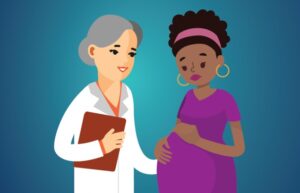Depression during pregnancy is a very common condition, but it is also one that is often overlooked. Many women feel ashamed or embarrassed to talk about their feelings of sadness, hopelessness, and irritability, so they suffer in silence. This can be very dangerous for both the mother and the baby. In this blog post, we will discuss the signs and symptoms of pregnancy depression, as well as other things that you need to know. So keep reading!
Contents
What Is Pregnancy Depression?
 Pregnancy depression is a form of clinical depression that can affect expectant mothers. It is a serious condition that, if left untreated, can have negative consequences for both the mother and her child. The condition is simply defined as a depressed mood during pregnancy.
Pregnancy depression is a form of clinical depression that can affect expectant mothers. It is a serious condition that, if left untreated, can have negative consequences for both the mother and her child. The condition is simply defined as a depressed mood during pregnancy.
However, it is important to note that not all women who experience a depressed mood during pregnancy will meet the criteria for a diagnosis of depression. The diagnosis generally includes different criteria and complete methods to rule out mental disorders.
Moreover, pregnancy depression is very common, affecting up to one in every seven women. It is also one of the most underdiagnosed and undertreated conditions in pregnant women. This is likely due to several factors, including the stigma associated with mental illness, lack of awareness about the condition, and lack of access to mental health services.
But if you think you might be experiencing pregnancy depression, it is important to seek help. Depression is a treatable condition, and there are many resources available to pregnant women who are struggling with this condition.
How To Recognize It?
There are many different symptoms of depression, and they can vary from person to person. Some common signs and symptoms of pregnancy depression include:
- Feeling sad, hopeless, or empty most of the time
- Loss of interest in activities that you used to enjoy
- Feeling tired all the time and having little energy
- Sleeping too much or not being able to sleep at all
- Trouble concentrating, making decisions, or remembering things
- Changes in appetite or weight (eating more or less than usual)
- Feeling anxious, irritable, or agitated
- Avoiding social activities and withdrawing from friends and family
- Feeling guilty, worthless, or helpless
- Having persistent physical symptoms that don’t have a clear cause, such as headaches or digestive problems
The signs are actually quite similar to those of clinical depression, but they’re often less severe. In pregnancy depression, you will still be able to function in your daily life, but you may not enjoy activities that you used to or feel up to dealing with the challenges of pregnancy.
If you’re experiencing any of these signs and symptoms, it’s important to talk to your doctor or midwife. They can help you figure out if what you’re experiencing is pregnancy depression or just the “baby blues,” which are common and usually go away on their own within a few days or weeks. It’s also important to remember that you’re not alone. Pregnancy depression is more common than you might think, and there is help available.
Is It Common To Get Depressed During Pregnancy?
 One study reports that pregnant women are more likely to experience depression during pregnancy than at any other time in their lives. In fact, one in seven women will experience clinical depression during pregnancy.
One study reports that pregnant women are more likely to experience depression during pregnancy than at any other time in their lives. In fact, one in seven women will experience clinical depression during pregnancy.
With such high numbers, both providers and patients need to be aware of the signs and symptoms of pregnancy depression, as well as the available resources for treatment. Because when it comes to depression during pregnancy, the sooner it’s identified and treated, the better.
Several theories are there suggesting why getting depressed during pregnancy is such a common phenomenon.
- One theory is that hormonal changes during pregnancy (particularly the increase in progesterone) can lead to mood swings and irritability, which can then trigger depression.
- Another possibility is that the stress of pregnancy (whether it’s financial stress, job-related stress, or simply the physical demands of being pregnant) can lead to depression.
Whatever the cause, it’s important for women to know that they are not alone if they are feeling depressed during pregnancy. Also, there have been so many advancements in the treatment of depression, so there is no need to suffer.
If you think you may be depressed during pregnancy, it’s important to talk to your doctor or midwife. They can help you get the treatment you need to feel better.
Does Pregnancy Cause Depression?
Depression is itself a mental disorder that is characterized by a persistent low mood. So, it is difficult to say that pregnancy causes depression. However, there are many risk factors for developing depression during pregnancy. But somehow yes, pregnancy increases the risk of developing depression.
Because of the hormonal changes during pregnancy, some women feel more emotional than usual. These mood swings are normal during pregnancy. However, if these mood swings last for more than two weeks, it could be a sign of depression.
According to studies, about 15 percent of pregnant women suffer from depression. If the mother is depressed, it can also affect the baby. Depression during pregnancy can lead to low birth weight and preterm labor. There are many ways to get help if you think you are suffering from depression.
However, there is also one thing that we have to remember. Depression is not a sign of weakness. It is a real medical condition that needs treatment. If you think you are suffering from depression, do not hesitate to seek help from a doctor or mental health professional.
Causes And Risk Factors Of Pregnancy Depression
 There are various causes and risk factors of pregnancy depression. Some women may be more susceptible to developing this condition due to certain physical or psychological characteristics. Let’s discuss what factors can contribute to the development of pregnancy-related depression, including:
There are various causes and risk factors of pregnancy depression. Some women may be more susceptible to developing this condition due to certain physical or psychological characteristics. Let’s discuss what factors can contribute to the development of pregnancy-related depression, including:
Hormonal changes
This is one of the most significant changes that a woman’s body goes through during pregnancy. The levels of estrogen and progesterone increase dramatically, which can lead to mood swings and feelings of sadness or depression. For example, some women may feel more depressed during the “postpartum blues” period after they give birth.
Previous history of depression or mental illness
If a woman has previously struggled with depression, anxiety, or any other mental illness, she may be more likely to experience pregnancy-related depression. This is especially true if her mental health condition was not adequately treated before becoming pregnant. A woman with a history of mental illness should be sure to inform her healthcare provider so that they can monitor her closely during pregnancy.
Living alone
Sometimes, it is hard to identify what is causing depression during pregnancy. If you are living alone, it may be difficult to find someone to talk to about how you’re feeling. You might feel like you’re the only one going through this experience. And living alone can develop depression in normal circumstances, much less when you’re pregnant.
Age at the time of your pregnancy
 This cause is a little more difficult to pin down. Some studies show that first-time mothers are at an increased risk for developing depression during pregnancy, while others suggest the opposite. There is also evidence to suggest that women who become pregnant later in life (over the age of 35) may be at a higher risk for developing depression during pregnancy.
This cause is a little more difficult to pin down. Some studies show that first-time mothers are at an increased risk for developing depression during pregnancy, while others suggest the opposite. There is also evidence to suggest that women who become pregnant later in life (over the age of 35) may be at a higher risk for developing depression during pregnancy.
Complicated pregnancy
This one is a very common cause of depression among pregnant women. These pregnancies are often accompanied by various complications, such as premature birth, low birth weight, and congenital anomalies. While it’s normal to feel anxious about this but some women develop major depression.
Risk factor
There are many risk factors for developing depression during pregnancy. Some of these include:
- Mood disorders
- Exposure to stressful life events
- Inadequate social support
- Poor physical health
- Genetic component
- Previous complicated pregnancy
- Financial stressors
- Relationship difficulties
So above are some of the risk factors, it is important to understand that not all women will experience depression during pregnancy and that not all women who experience these risk factors will develop depression. However, it is important to be aware of them so you can be on the lookout for signs in yourself or your loved ones.
With the right support, women can and do recover from depression during pregnancy. If you are feeling depressed, please reach out for help.
What Are The Consequences?
If left untreated, depression during pregnancy can lead to serious consequences for both the mother and child. Untreated depression has been linked to an increased risk of:
Premature birth
This is one of the common consequences and can be very dangerous for both the mother and child. The scientific reason behind premature birth is although the mother may have carried the child for nine months, the placenta might not have developed enough to support the baby during those last few weeks.
Low birth weight
Babies of depressed mothers are more likely to be born with low birth weight. Low birth weight babies are at an increased risk for health problems and even death. It happens because the mother might not be getting enough nutrients during pregnancy.
Miscarriage
Depression has also been linked to an increased risk of miscarriage. It is thought that this may be due to the fact that depressed mothers are more likely to have unhealthy lifestyles, such as smoking or drinking. And eventually, this will lead to the baby being miscarried.
Pregnancy complications
Depression during pregnancy has also been linked to an increased risk of developing pregnancy complications, such as preeclampsia. It is also associated that complications during pregnancy may lead to depression.
Postpartum depression
It is estimated that postpartum depression affects approximately new mothers. Despite the high incidence of postpartum depression, it is often overlooked because many people believe that “the baby blues” are a normal part of having a baby. However, if you are feeling persistently sad, anxious, or hopeless after having a baby, it is important to seek help.
Behavioral problems in children
 If you are suffering from pregnancy depression, then further it negatively impacts your behavior towards your children. Studies have shown that women who suffer from prenatal depression are more likely to have children with behavioral problems. These problems may include ADHD, anxiety, and depression. So do not avoid this condition and seek out help!
If you are suffering from pregnancy depression, then further it negatively impacts your behavior towards your children. Studies have shown that women who suffer from prenatal depression are more likely to have children with behavioral problems. These problems may include ADHD, anxiety, and depression. So do not avoid this condition and seek out help!
Pregnancy is a time of great change and upheaval, so it’s normal to feel some stress and anxiety. But if you’re feeling overwhelming sadness, hopelessness, or disconnection from your baby, then you may be suffering from pregnancy depression. Many women suffer from this condition and don’t seek help because they think it’s just a part of pregnancy.
However, untreated depression can have serious consequences for both you and your child. Therefore, if you’re feeling depressed, don’t suffer in silence- seek out help from a mental health professional. With treatment, you can overcome this condition and have a healthy pregnancy!
How To Diagnose It?
The diagnosis of pregnancy depression is not always easy. Many of the symptoms, such as fatigue and changes in appetite, are common during pregnancy and can be mistaken for simply “normal” pregnancy discomforts. And, of course, the stress and joy that come with becoming a parent can also cause mood swings.
So how can you tell if you’re just experiencing the normal ups and downs of pregnancy or if you may be suffering from depression?
The best way to find out is to talk to your doctor or midwife. They can ask you questions about how you’re feeling and rule out any other possible causes for your symptoms, such as lack of sleep or an underlying medical condition. The process of diagnosis for pregnancy depression is similar to that for diagnosing depression at any other time in your life.
It involves a discussion of your symptoms and how long you’ve been experiencing them. Your doctor will also want to rule out any other possible causes for your symptoms and may ask about your family history of depression. This is simply known as a clinical interview and it is considered to be the gold standard for diagnosing depression.
So, with an accurate diagnosis, you can actually get the help that you need to feel better. If you think that you may be suffering from pregnancy depression, don’t suffer in silence. Talk to your doctor or midwife today. They can help you get the treatment and support that you need.
Can It Be Treated?
 It might seem like you can’t get out of the funk you’re in, but with help, you can start to feel better. If you think you might be depressed, talk to your doctor. He or she can give you a checkup and make sure there’s no other reason for how you’re feeling. Moreover, there are several treatment options that can help you feel better. These include:
It might seem like you can’t get out of the funk you’re in, but with help, you can start to feel better. If you think you might be depressed, talk to your doctor. He or she can give you a checkup and make sure there’s no other reason for how you’re feeling. Moreover, there are several treatment options that can help you feel better. These include:
Talk therapy
This can help you understand and deal with the feelings that come with pregnancy depression. Talk therapy is believed to be especially helpful for pregnant women because it doesn’t involve taking medication. A therapist in this type of therapy can help you understand your thoughts and feelings, and give you the tools to deal with them. For example, he or she might teach you how to better deal with stress.
Cognitive-behavioral therapy
CBT is a type of psychotherapy that helps people change negative thinking and behavior patterns. It can be an effective treatment for depression during pregnancy. Because in this a therapist will help you to understand your thoughts and feelings, which can help you change the way you think and behave. For example in pregnancy depression, you may be thinking negative thoughts about yourself, your baby, and your ability to be a good mother. A therapist can help you to change these thoughts and teach you how to cope with your feelings.
Medication
During pregnancy, medications are usually the last resort. This is because many medications are not tested on pregnant women and we don’t know the effects they may have on the developing baby. However, if you are struggling with depression and other treatments haven’t worked, your doctor may prescribe medication. Some commonly prescribed medications are:
- Selective serotonin reuptake inhibitors (SSRIs)
- Serotonin and norepinephrine reuptake inhibitors (SNRIs)
- Tricyclic antidepressants (TCAs)
It’s important to talk to your doctor about the risks and benefits of any medication you are considering taking during pregnancy. Some medications, like bupropion, are not recommended for pregnant women. Others, like SSRIs, have been shown to be safe for both mother and baby.
Support groups
Support groups are believed to be helpful for people with depression. In a support group, you can share your experiences and feelings with others who are going through similar things. This can be a great way to get emotional support and practical advice from people who understand what you’re going through. There are many different types of support groups, including in-person groups, online groups, and groups specifically for pregnant women or new mothers.
If you’re interested in joining a support group, ask your doctor or mental health professional if they know of any good ones in your area. You can also search online for a “pregnancy depression support group” support group.
Self-help
 This is always crucial and plays a vital role in managing depression. Some self-help measures that can be useful are:
This is always crucial and plays a vital role in managing depression. Some self-help measures that can be useful are:
- Eating a balanced and healthy diet
- Getting regular exercise
- Avoiding alcohol and drugs
- Practicing relaxation techniques such as meditation or yoga
- Establishing supportive social connections
- Keeping a journal
- Thinking about baby names
- Researching baby care
- Taking a prenatal vitamin
- Making sure you’re getting enough sleep is also important
Pregnancy can be exhausting, and fatigue can worsen depression. These are all great things to do, but if you find that your depression symptoms are not improving, or if you have thoughts about harming yourself or your baby, it’s important to seek professional help.
If you think you might be depressed during pregnancy, talk to your doctor. Many women experience some form of the “blues” during pregnancy, but if your symptoms are severe or last more than a couple of weeks, you may have pregnancy depression.
There are treatments that can help. With proper care, most women with pregnancy depression will have a healthy pregnancy and go on to have a healthy baby.
Conclusion
Conclusively, pregnancy depression is a real and serious problem. If you are experiencing any symptoms, please reach out to your doctor or mental health professional. There is no shame in admitting that you need help and support during this difficult time. Because if you don’t get the help you need, it could have serious consequences for both you and your baby.
Therefore, if you feel like you are struggling, please reach out for help. Pregnancy is a beautiful time, but it can also be very difficult. Remember, you are not alone and there is help available.
For more information and tips you can contact Therapy Mantra. We have a team of professional therapists who can provide you with the support and guidance you need to recover from this condition. Contact us today to learn more about our services. You can also book an online therapy session or download our free Android or iOS app.


